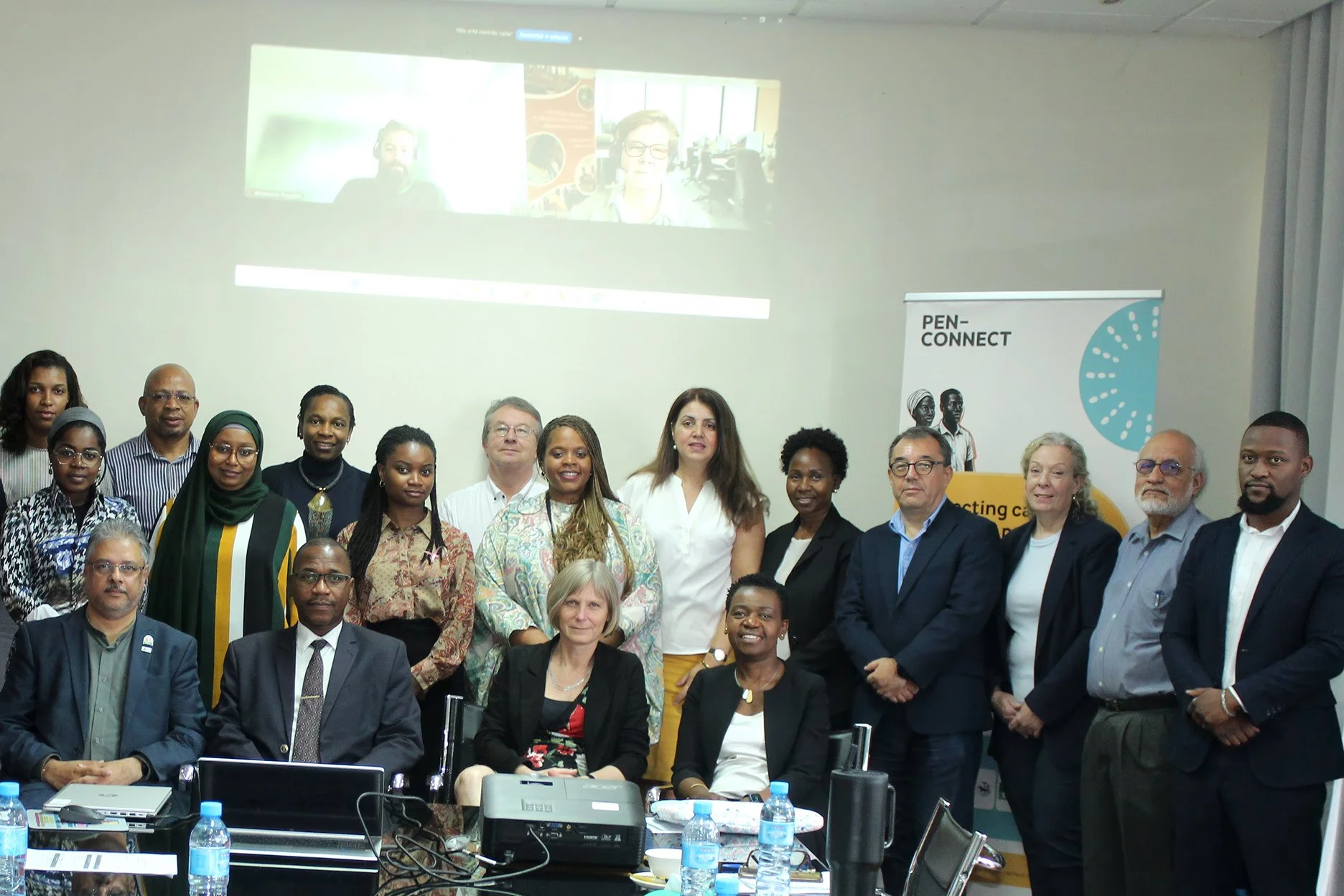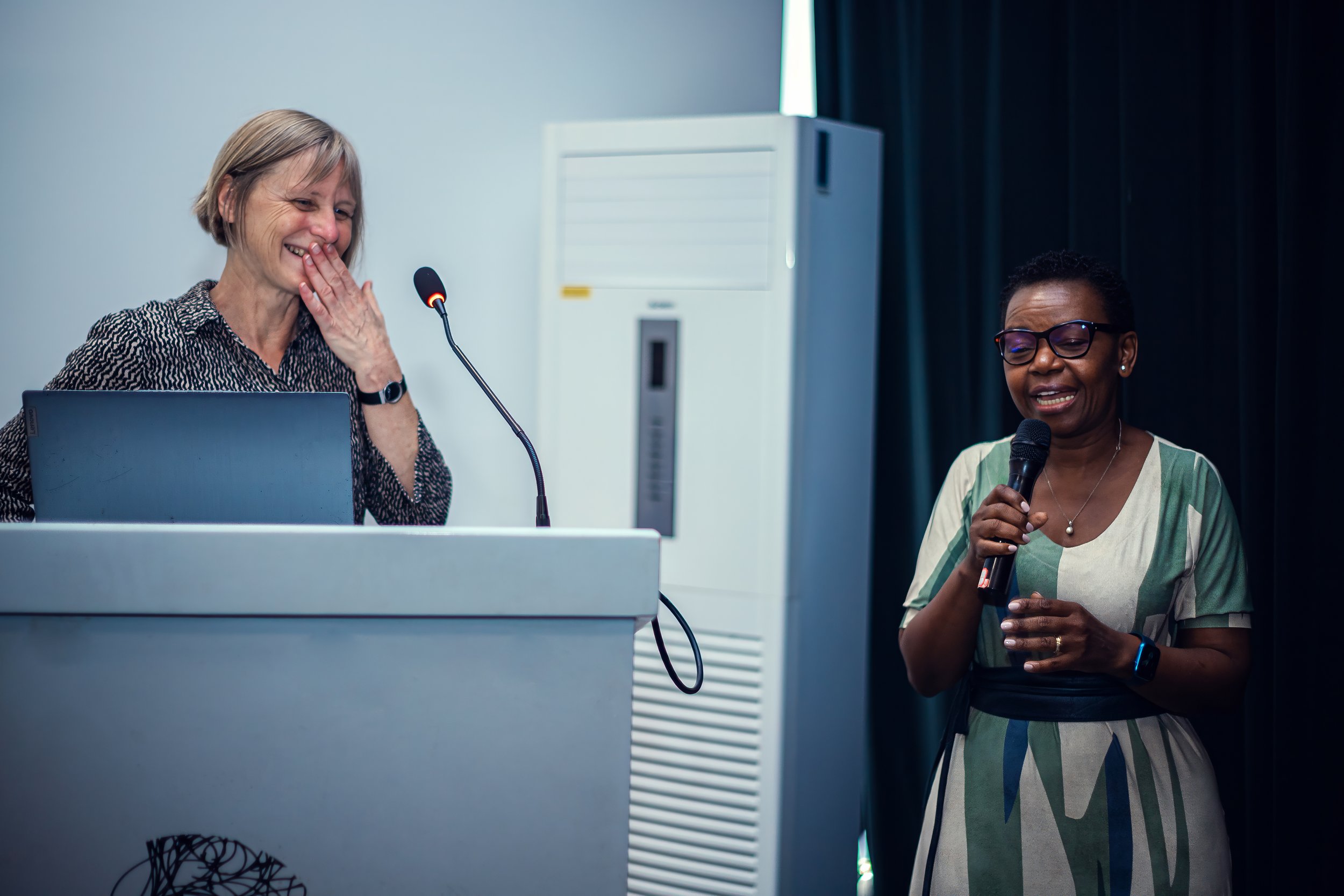PEN-CONNECT Launches in Maputo
The new initiative aims to strengthen global collaboration and research on the prevention and management of noncommunicable diseases in low- and middle-income countries.
Participants in the PEN-CONNECT launch included the project’s co-principal investigators, Dr. Kerstin Klipstein-Grobusch, an associate professor of global health at the University Medical Center Utrecht in the Netherlands (seated, third from left), and Dr. Ana Mocumbi, an associate professor of cardiology at Universidade Eduardo Mondlane in Maputo, Mozambique (seated, fourth from left).
Universidade Eduardo Mondlane recently hosted the official launch of PEN-CONNECT, a major initiative aimed at strengthening global collaboration and research on the prevention and management of noncommunicable diseases in low- and middle-income countries.
The NCDI Poverty Network co-secretariat housed at the university hosted the event in Maputo on October 30. The event gathered representatives from the European Union, the Mozambican Ministry of Health, international research institutions, and local partners.
“This launch marked an important milestone for scientific cooperation between Europe and Africa,” said Dr. Ana Mocumbi, co-principal investigator of PEN-CONNECT and co-chair of the NCDI Poverty Network. “We were able to reaffirm our shared commitment to promoting equitable and evidence-based approaches to health system strengthening.”
Funded by the European Union’s Horizon Europe Programme, PEN-CONNECT is implemented through a collaboration led by Universidade Eduardo Mondlane, which is one of two co-secretariats for the NCDI Poverty Network; University Medical Center Utrecht in the Netherlands; the London School of Hygiene and Tropical Medicine; and the Ludwig-Maximilian University of Munich.
The project’s primary objective is to generate actionable evidence to enhance the integration of NCD care—particularly for chronic and complex conditions—within primary healthcare systems. It also seeks to build institutional research capacity and promote cross-country learning among partner institutions in Africa and Europe.
The launch day began with a High-Level Kick-Off Meeting, during which consortium partners discussed the project’s objectives, structure, and implementation timelines.
Dr. Mocumbi joined with her fellow co-principal investigator, Dr. Kerstin Klipstein-Grobusch, a professor at the University Medical Center Utrecht, in outlining the design of the project, highlighting the interdisciplinary focus, and detailing the expected contributions to policy and practice.
The PEN-CONNECT co-principal investigators, Dr. Kerstin Klipstein-Grobusch (left), a professor at the University Medical Center Utrecht, and Dr. Ana Mocumbi, co-chair of the NCDI Poverty Network, share a laugh during the launch of the new initiative. (Photos courtesy of Universidade Eduardo Mondlane)
Technical sessions moderated by the London School of Hygiene and Tropical Medicine delved into the methodological and operational aspects, focusing on health data systems and implementation research. Participants also took part in networking sessions to foster collaboration and shared understanding of the project’s goals.
During the official opening ceremony, Thanasis Rogdakis, a European Union project officer, introduced the Horizon Europe funding framework and reaffirmed the European Union’s commitment to supporting research excellence and equitable partnerships. He underscored the importance of projects like PEN-CONNECT in generating local solutions to global health challenges.
Dr. Mocumbi then presented the first segment of the project overview, focusing on its vision and alignment with Mozambique’s health research priorities. Dr. Klipstein-Grobusch followed with a presentation on the international consortium and its multidisciplinary team.
Following the Maputo launch event, Universidade Eduardo Mondlane hosted complementary meetings in central Mozambique—in Nhamatanda, the site of Mozambique’s only PEN-Plus clinic, and the coastal city of Beira. These sessions brought together Instituto Nacional de Saúde representatives, provincial and district health authorities, and local implementing partners.
“These gatherings provided an opportunity for us to introduce PEN-CONNECT to local stakeholders and align it with ongoing health initiatives,” said Dr. Mocumbi. “In advance of our implementing PEN-CONNECT in Nhamatanda, these discussions served to strengthen coordination, identify synergies, and ensure that research activities are grounded in local priorities and realities.”


